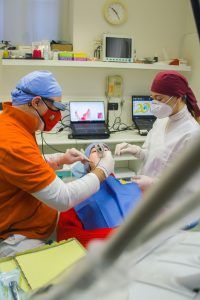
Surgical dentistry is a vital and rapidly growing branch of dental medicine that deals with the diagnosis, treatment, and prevention of oral and maxillofacial diseases. It involves the use of surgical procedures to repair, restore, or enhance the function and appearance of teeth, gums, and other structures of the mouth. Surgical dentistry encompasses a wide range of procedures, including tooth extraction, dental implant placement, and oral cancer surgery, as well as correction of facial deformities, injury and accident-related injuries, jaw growth and development disorders, and cosmetic procedures, such as jaw reshaping and facial aesthetics.
Tooth Extractions
Tooth extraction is one of the most common procedures in surgical dentistry. It is performed to remove teeth that are damaged, decayed, or infected beyond repair. The procedure can be performed under local anesthesia, which numbs the area around the tooth, or under general anesthesia, which puts the patient to sleep. Before the extraction, the dentist will take a panoramic X-ray to locate the tooth, as well as any surrounding nerves, blood vessels, and bone. During the extraction, the tooth will be loosened with an elevator and then gently removed with forceps.
Implant Placements
Implant placement is a popular procedure in surgical dentistry. Dental implants are small metal posts that are surgically placed in the jawbone to support replacement teeth such as bridges or dentures. The implant procedure usually requires several steps and can take several months to complete; however, it offers a long-lasting and natural-looking solution for missing teeth. The first step is to place the implant in the jawbone, which is performed under local anesthesia or IV sedation. The implant is then left to fuse with the bone, a process called osseointegration, which can take several weeks or months. Once the implant has fused with the bone, the dentist places an abutment, or connector, on the implant to support the replacement tooth.
Oral Cancer Surgery
Oral cancer surgery is another important area of surgical dentistry. Oral cancer can affect any part of the mouth, including the lips, tongue, gums, and cheeks, and early detection and treatment are crucial for a positive outcome. A surgical dentist will perform a biopsy to confirm the diagnosis, and if it is cancer, remove the tumor and surrounding tissue. The extent of surgery depends on the size, location, and stage of the cancer. Radiation and chemotherapy may also be recommended, in addition to the surgery, to ensure that all cancer cells are removed.
Facial Deformity Correction
Another area of surgical dentistry is the correction of facial deformities, injuries and accident-related injuries, jaw growth, and developmental disorders. Surgical dentists are qualified to correct congenital and acquired jaw and facial deformities such as cleft lip and palate, jaw tumors, and temporomandibular joint disorders. They can also treat injuries to the face and jaw caused by accidents, such as fractures, lacerations, and dislocations.
Cosmetic Procedures
Moreover, Cosmetic procedures like jaw reshaping and facial aesthetics are widely performed by surgical dentists. Surgical dentists can reshape the jaw to improve bite and chewing function, as well as for aesthetic reasons. They can also use fillers, Botox, and other cosmetic procedures to improve facial aesthetics and balance.
Read more about Cosmetic Dentistry HERE.
Summary
Surgical dentistry encompasses a wide range of procedures, from tooth extraction and dental implant placement to oral cancer surgery, as well as correction of facial deformities, injury and accident-related injuries, jaw growth and development disorders, and cosmetic procedures, such as jaw reshaping and facial aesthetics. It’s performed by dental surgeons who are trained to diagnose, treat, and prevent oral and maxillofacial diseases and conditions. Surgical dentistry offers solutions for restoring function and appearance of the teeth, gums, and other structures in the mouth and face.
It is important to understand that surgical dentistry is not only about improving aesthetics, but also about improving the health and function of the entire oral cavity and facial structures. Surgical procedures can be complex and require the expertise of highly trained and qualified professionals.
When choosing a surgical dentist, it’s essential to look for one who is certified by the American Board of Oral and Maxillofacial Surgery (ABOMS) or have completed a general practice residency. This ensures that they are knowledgeable and can perform the desired procedure. Look for a surgeon or dentist with a good track record who has performed the procedures many times before.
Only surgeons can be certified by ABOMS, but general dentists who are trained and practiced can perform many of the same procedures at the same level of capability.
Conclusion
Surgical dentistry offers a wide range of procedures that can improve the health, function, and appearance of the teeth, gums, and other structures of the mouth and face. If you’re considering a surgical procedure, it’s important to consult with a qualified and experienced surgical dentist to determine the best course of treatment for you. With the right practitioner and proper care, surgical dentistry can help you achieve optimal oral health and a beautiful smile.

